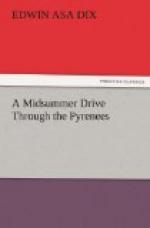“‘By my faith,’ answered the squire, ’they have frequently asked him, but he knows nothing about it. The first time it happened was on a night following a day when he had hunted a wonderfully large bear in the woods of Bearn. This bear had killed four of his dogs and wounded many more, so that the others were afraid of him; upon which Sir Peter drew his sword of Bordeaux steel and advanced on the bear with great rage on account of the loss of his dogs; he combated him a long time with much bodily danger, and with difficulty slew him; when he returned to his castle of Languedudon in Biscay, and had the bear carried with him. Every one was astonished at the enormous size of the beast and the courage of the knight who had attacked and slain him.
“’But when the Countess of Biscay, his wife, saw the bear, she instantly fainted and was carried to her chamber, where she continued very disconsolate all that and the following day, and would not say what ailed her. On the third day she told her husband she should never recover her health until she had made a pilgrimage to St. James’ shrine at Compostella. “Give me leave therefore to go thither and to carry my son Peter and my daughter Adrienne with me; I request it of you.” Sir Peter too easily complied; she had packed up all her jewels and plate unobserved by any one; for she had resolved never to return again.
“’The lady set out on her pilgrimage, and took that opportunity of visiting her cousins, the King and Queen of Castile, who entertained her handsomely. She is still with them, and will never return herself nor send her children. The same night he had hunted and killed the bear, this custom of walking in his sleep seized him. It is rumored the lady was afraid of something unfortunate happening, the moment she saw the bear, and this caused her fainting; for that her father once hunted this bear, and during the chace a voice cried out, though he saw nobody: “Thou huntest me, yet I wish thee no ill; but thou shalt die a miserable death!” The lady remembered this when she saw the bear, as well as that her father had been beheaded by Don Pedro without any cause; and she maintains that something unfortunate will happen to her husband, and that what passes now is nothing to what will come to pass.’”
V.
White clouds scud away before the breeze, as we climb down toward the torrent again before breakfast and cross a diminutive foot-bridge to a path on the other side. The sun is at his post. “All Nature smiles,” here in the mountains as over the plains, and promises lavishly for the day. The ramble brings a sharpened appetite, and we come back to the sunny breakfast-room, to find flowers at the plates of mesdames and mademoiselle, and a family of Pyrenean trout, drawn out within the half-hour from a trout-well by the stream, in crisp readiness upon the table.
We have planned for a view to-day of the great Pic du Midi d’Ossau,—the mountain seen so sharply from Pau. It is not in sight at Eaux Chaudes; but it is the giant of this section of the range,—a noon-mark for an entire province. There is no mountain resort without its pet excursions, and there are three here which take the lead. One is to Goust, another to the Grotto; but the foremost is to Gabas and the majestic Pic.




